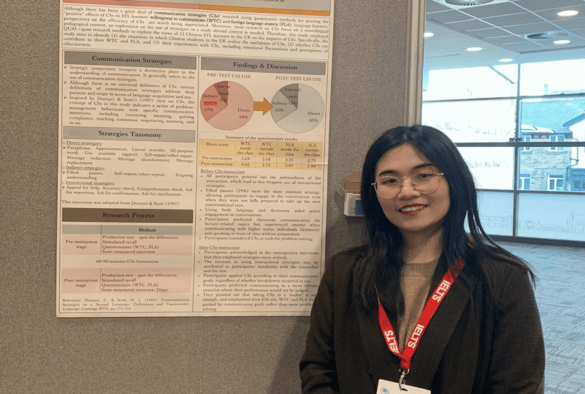Becoming an expert: understanding language struggles through communication strategies
Published on

Zhiming Yang is a final-year PhD student in the Department of English, with a research focus on the use of communication strategies by Chinese language learners of English in the UK. Her research employs sociocultural theory, particularly the theory of mediation and activity, to understand the role of communication strategies in social interactions, as well as language learners’ willingness to communicate and foreign language anxiety. Currently, she is in the final writing-up stage of her research and is also exploring potential avenues for further investigation.
Visible language barrier and invisible struggles
My own experience as a non-native English speaker studying in the UK massively influenced my PhD topic. Every day in Liverpool I would face some form of language barrier – the use of Scouse slang took a lot of getting used to and it was a while before I realised the true meaning of the phrase “having a cob on!” Accents, conversation speed, feeling anxious about making requests or refusals and worrying about unintentionally offending others by using English improperly were all barriers to my communication, particularly when I first arrived. This led me to realise the importance of communication strategies when speaking English such as paraphrasing, seeking assistance, message reduction, and using fillers to overcome obstacles in communication. Through conversations with my Chinese friends and other friends who speak English as a foreign language, I discovered that we shared similar difficulties and sometimes used similar strategies to navigate them. This every day experience led me to focus my research exploring language learners' experiences of using communication strategies.
The situation for language learners changes dramatically in the UK compared to the environment where they initially studied English as a foreign language in their home countries. Rather than studying the language, they are expected to acquire it. The English experience is completely different in the UK, which often leads to doubts and makes non-native speakers wonder whether their previous English learning endeavours were “in vain.” My research interviews with thirteen Chinese learners of English, who learned English as a foreign language and have been studying in the UK for over a year, have so far revealed additional challenges that have not been fully analysed. These include effectively interacting with native speakers, staying motivated in a self-regulated learning environment, and bridging the gap between limited language proficiency and conveying meaning.
Do communication strategies help overcome language barriers?
Previous research on communication strategies has found that such strategies were usually used as a tool to solve communicative problems and to improve language speaking performance. As both a researcher and a language learner, I have come to realise that while communication strategies can be helpful tools for problem-solving and enhancing communication, they may not always be as effective as expected. It is therefore necessary to think beyond the traditional definition of communication strategies as problem-solving tools, placing "communication" itself at the centre of analysis. That’s why in my research, I have adopted Vygotsky's (1978) sociocultural theory, which emphasises the role of communication, interaction, and cultural context in human development, to provide a broader framework to understand the behaviour of language learners.
How do individual differences function in communication?
When it comes to communication, language learners behave differently to one another – even when they share the same educational background, language proficiency level and communicative purposes. Understanding these individual differences, particularly in a learner's willingness to communicate (a learner's motivation and confidence to initiate and maintain communication in the target language) and their experience of foreign language anxiety (the fear of using a target language), is crucial for understanding the use of communication strategies in conversations. These two factors play a significant role in a learner's language acquisition process as they influence their engagement and interaction with others in the target language. My analysis has so far shown communication strategies help non-native English speakers have a more realistic identification of their “ought-to language self.” This means they initially expect their own English-speaking ability to be fluent, like that of native speakers, but being aware of communication strategies helps them realise their identity as “language learners” and their levels of foreign language anxiety reduce. I haven’t yet found a direct connection between willingness to communicate and communication strategies but I’m sure there is still much intriguing information to be uncovered as I delve deeper into my research participants' experiences!
Looking forward
As I’m in the final stage of writing up my thesis and preparing for submission, it is an exhilarating time for me as I reflect on the journey that brought me here and contemplate my future endeavours. My experience of living in a multilingual, multi-accented environment in Liverpool and the COVID lockdown has shifted my focus from solely helping studying-abroad language learners to deal with language problems to understanding how the situation, community, and rules of culture shape their use of language and how they perceive their own language abilities. My PhD research has helped me identify my true passion—unravelling the complexities of language identity and exploring the nuances in communication strategies. I look forward to using the knowledge and skills I have acquired during my PhD in future academic research about language and communication.